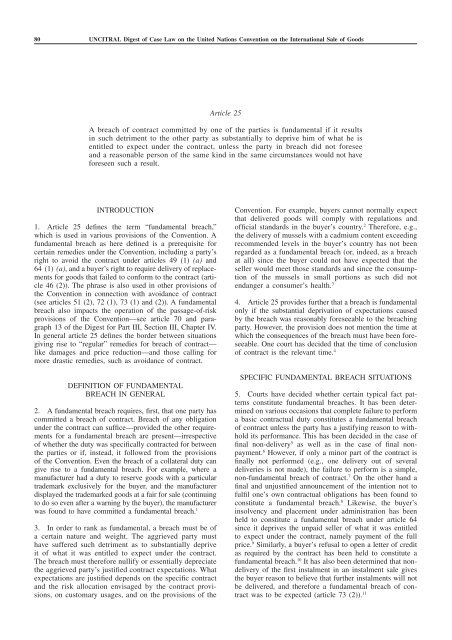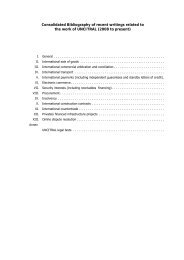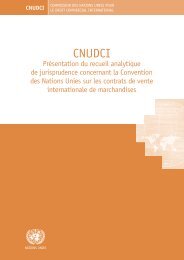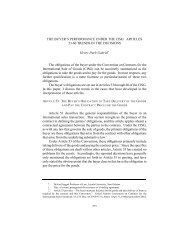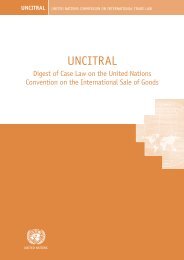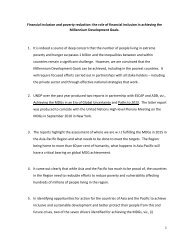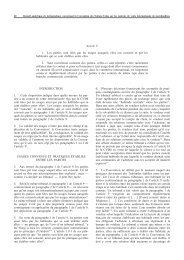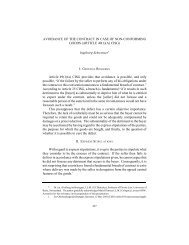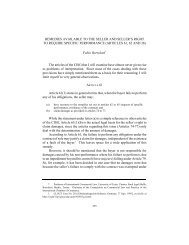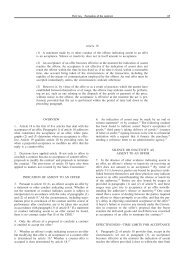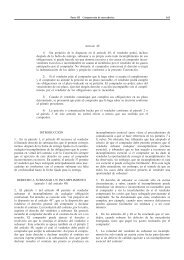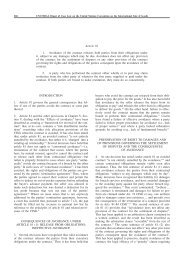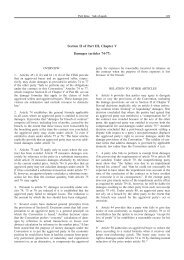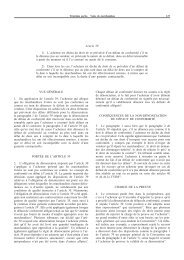Article 25 A breach of contract committed by one of the ... - uncitral
Article 25 A breach of contract committed by one of the ... - uncitral
Article 25 A breach of contract committed by one of the ... - uncitral
Create successful ePaper yourself
Turn your PDF publications into a flip-book with our unique Google optimized e-Paper software.
80 UNCITRAL Digest <strong>of</strong> Case Law on <strong>the</strong> United Nations Convention on <strong>the</strong> International Sale <strong>of</strong> Goods<br />
<strong>Article</strong> <strong>25</strong><br />
A <strong>breach</strong> <strong>of</strong> <strong>contract</strong> <strong>committed</strong> <strong>by</strong> <strong>one</strong> <strong>of</strong> <strong>the</strong> parties is fundamental if it results<br />
in such detriment to <strong>the</strong> o<strong>the</strong>r party as substantially to deprive him <strong>of</strong> what he is<br />
entitled to expect under <strong>the</strong> <strong>contract</strong>, unless <strong>the</strong> party in <strong>breach</strong> did not foresee<br />
and a reasonable person <strong>of</strong> <strong>the</strong> same kind in <strong>the</strong> same circumstances would not have<br />
foreseen such a result.<br />
INTRODUCTION<br />
1. <strong>Article</strong> <strong>25</strong> defines <strong>the</strong> term “fundamental <strong>breach</strong>,”<br />
which is used in various provisions <strong>of</strong> <strong>the</strong> Convention. A<br />
fundamental <strong>breach</strong> as here defined is a prerequisite for<br />
certain remedies under <strong>the</strong> Convention, including a party’s<br />
right to avoid <strong>the</strong> <strong>contract</strong> under articles 49 (1) (a) and<br />
64 (1) (a), and a buyer’s right to require delivery <strong>of</strong> replacements<br />
for goods that failed to conform to <strong>the</strong> <strong>contract</strong> (article<br />
46 (2)). The phrase is also used in o<strong>the</strong>r provisions <strong>of</strong><br />
<strong>the</strong> Convention in connection with avoidance <strong>of</strong> <strong>contract</strong><br />
(see articles 51 (2), 72 (1), 73 (1) and (2)). A fundamental<br />
<strong>breach</strong> also impacts <strong>the</strong> operation <strong>of</strong> <strong>the</strong> passage-<strong>of</strong>-risk<br />
provisions <strong>of</strong> <strong>the</strong> Convention—see article 70 and paragraph<br />
13 <strong>of</strong> <strong>the</strong> Digest for Part III, Section III, Chapter IV.<br />
In general article <strong>25</strong> defines <strong>the</strong> border between situations<br />
giving rise to “regular” remedies for <strong>breach</strong> <strong>of</strong> <strong>contract</strong>—<br />
like damages and price reduction—and those calling for<br />
more drastic remedies, such as avoidance <strong>of</strong> <strong>contract</strong>.<br />
DEFINITION OF FUNDAMENTAL<br />
BREACH IN GENERAL<br />
2. A fundamental <strong>breach</strong> requires, first, that <strong>one</strong> party has<br />
<strong>committed</strong> a <strong>breach</strong> <strong>of</strong> <strong>contract</strong>. Breach <strong>of</strong> any obligation<br />
under <strong>the</strong> <strong>contract</strong> can suffice—provided <strong>the</strong> o<strong>the</strong>r requirements<br />
for a fundamental <strong>breach</strong> are present—irrespective<br />
<strong>of</strong> whe<strong>the</strong>r <strong>the</strong> duty was specifically <strong>contract</strong>ed for between<br />
<strong>the</strong> parties or if, instead, it followed from <strong>the</strong> provisions<br />
<strong>of</strong> <strong>the</strong> Convention. Even <strong>the</strong> <strong>breach</strong> <strong>of</strong> a collateral duty can<br />
give rise to a fundamental <strong>breach</strong>. For example, where a<br />
manufacturer had a duty to reserve goods with a particular<br />
trademark exclusively for <strong>the</strong> buyer, and <strong>the</strong> manufacturer<br />
displayed <strong>the</strong> trademarked goods at a fair for sale (continuing<br />
to do so even after a warning <strong>by</strong> <strong>the</strong> buyer), <strong>the</strong> manufacturer<br />
was found to have <strong>committed</strong> a fundamental <strong>breach</strong>. 1<br />
3. In order to rank as fundamental, a <strong>breach</strong> must be <strong>of</strong><br />
a certain nature and weight. The aggrieved party must<br />
have suffered such detriment as to substantially deprive<br />
it <strong>of</strong> what it was entitled to expect under <strong>the</strong> <strong>contract</strong>.<br />
The <strong>breach</strong> must <strong>the</strong>refore nullify or essentially depreciate<br />
<strong>the</strong> aggrieved party’s justified <strong>contract</strong> expectations. What<br />
expectations are justified depends on <strong>the</strong> specific <strong>contract</strong><br />
and <strong>the</strong> risk allocation envisaged <strong>by</strong> <strong>the</strong> <strong>contract</strong> provisions,<br />
on customary usages, and on <strong>the</strong> provisions <strong>of</strong> <strong>the</strong><br />
Convention. For example, buyers cannot normally expect<br />
that delivered goods will comply with regulations and<br />
<strong>of</strong>ficial standards in <strong>the</strong> buyer’s country. 2 Therefore, e.g.,<br />
<strong>the</strong> delivery <strong>of</strong> mussels with a cadmium content exceeding<br />
recommended levels in <strong>the</strong> buyer’s country has not been<br />
regarded as a fundamental <strong>breach</strong> (or, indeed, as a <strong>breach</strong><br />
at all) since <strong>the</strong> buyer could not have expected that <strong>the</strong><br />
seller would meet those standards and since <strong>the</strong> consumption<br />
<strong>of</strong> <strong>the</strong> mussels in small portions as such did not<br />
endanger a consumer’s health. 3<br />
4. <strong>Article</strong> <strong>25</strong> provides fur<strong>the</strong>r that a <strong>breach</strong> is fundamental<br />
only if <strong>the</strong> substantial deprivation <strong>of</strong> expectations caused<br />
<strong>by</strong> <strong>the</strong> <strong>breach</strong> was reasonably foreseeable to <strong>the</strong> <strong>breach</strong>ing<br />
party. However, <strong>the</strong> provision does not mention <strong>the</strong> time at<br />
which <strong>the</strong> consequences <strong>of</strong> <strong>the</strong> <strong>breach</strong> must have been foreseeable.<br />
One court has decided that <strong>the</strong> time <strong>of</strong> conclusion<br />
<strong>of</strong> <strong>contract</strong> is <strong>the</strong> relevant time. 4<br />
SPECIFIC FUNDAMENTAL BREACH SITUATIONS<br />
5. Courts have decided whe<strong>the</strong>r certain typical fact patterns<br />
constitute fundamental <strong>breach</strong>es. It has been determined<br />
on various occasions that complete failure to perform<br />
a basic <strong>contract</strong>ual duty constitutes a fundamental <strong>breach</strong><br />
<strong>of</strong> <strong>contract</strong> unless <strong>the</strong> party has a justifying reason to withhold<br />
its performance. This has been decided in <strong>the</strong> case <strong>of</strong><br />
final non-delivery 5 as well as in <strong>the</strong> case <strong>of</strong> final nonpayment.<br />
6 However, if only a minor part <strong>of</strong> <strong>the</strong> <strong>contract</strong> is<br />
finally not performed (e.g., <strong>one</strong> delivery out <strong>of</strong> several<br />
deliveries is not made), <strong>the</strong> failure to perform is a simple,<br />
non-fundamental <strong>breach</strong> <strong>of</strong> <strong>contract</strong>. 7 On <strong>the</strong> o<strong>the</strong>r hand a<br />
final and unjustified announcement <strong>of</strong> <strong>the</strong> intention not to<br />
fulfil <strong>one</strong>’s own <strong>contract</strong>ual obligations has been found to<br />
constitute a fundamental <strong>breach</strong>. 8 Likewise, <strong>the</strong> buyer’s<br />
insolvency and placement under administration has been<br />
held to constitute a fundamental <strong>breach</strong> under article 64<br />
since it deprives <strong>the</strong> unpaid seller <strong>of</strong> what it was entitled<br />
to expect under <strong>the</strong> <strong>contract</strong>, namely payment <strong>of</strong> <strong>the</strong> full<br />
price. 9 Similarly, a buyer’s refusal to open a letter <strong>of</strong> credit<br />
as required <strong>by</strong> <strong>the</strong> <strong>contract</strong> has been held to constitute a<br />
fundamental <strong>breach</strong>. 10 It has also been determined that nondelivery<br />
<strong>of</strong> <strong>the</strong> first instalment in an instalment sale gives<br />
<strong>the</strong> buyer reason to believe that fur<strong>the</strong>r instalments will not<br />
be delivered, and <strong>the</strong>refore a fundamental <strong>breach</strong> <strong>of</strong> <strong>contract</strong><br />
was to be expected (article 73 (2)). 11
Part three. Sale <strong>of</strong> goods 81<br />
6. As a rule late performance—whe<strong>the</strong>r late delivery <strong>of</strong> 8. Special problems arise when <strong>the</strong> goods are defective but<br />
<strong>the</strong> goods or late payment <strong>of</strong> <strong>the</strong> price—does not in itself repairable. Some courts have held that easy repairability precludes<br />
finding a fundamental <strong>breach</strong>. 23 Courts are reluctant to<br />
constitute a fundamental <strong>breach</strong> <strong>of</strong> <strong>contract</strong>. 12 Only when<br />
<strong>the</strong> time for performance is <strong>of</strong> essential importance ei<strong>the</strong>r consider a <strong>breach</strong> fundamental when <strong>the</strong> seller <strong>of</strong>fers and effects<br />
because it is so <strong>contract</strong>ed 13 or due to evident circumstances speedy repair without any inconvenience to <strong>the</strong> buyer. 24<br />
(e.g., seasonal goods) 14 does delay as such amount to a<br />
fundamental <strong>breach</strong>. 15 But even if a delay is not fundamental 9. The violation <strong>of</strong> o<strong>the</strong>r <strong>contract</strong>ual obligations can also<br />
<strong>breach</strong>, <strong>the</strong> Convention allows <strong>the</strong> aggrieved party to fix an amount to a fundamental <strong>breach</strong>. It is, however, necessary<br />
additional period <strong>of</strong> time for performance; if <strong>the</strong> party in that <strong>the</strong> <strong>breach</strong> deprive <strong>the</strong> aggrieved party <strong>of</strong> <strong>the</strong> main<br />
<strong>breach</strong> fails to perform during that period, <strong>the</strong> aggrieved benefit <strong>of</strong> <strong>the</strong> <strong>contract</strong> and that this result could have been<br />
party may <strong>the</strong>n declare <strong>the</strong> <strong>contract</strong> avoided (articles 49 (1) (b) foreseen <strong>by</strong> <strong>the</strong> o<strong>the</strong>r party. Thus, a court stated that <strong>the</strong>re<br />
and 64 (1) (b)). 16 Therefore in such a case, but only in is no fundamental <strong>breach</strong> in case <strong>of</strong> delivery <strong>of</strong> incorrect<br />
that case, <strong>the</strong> lapse <strong>of</strong> <strong>the</strong> additional period turns a nonfundamental<br />
delay in performance into a sufficient reason never<strong>the</strong>less merchantable or if <strong>the</strong> buyer itself could—at <strong>the</strong><br />
certificates pertaining to <strong>the</strong> goods if ei<strong>the</strong>r <strong>the</strong> goods were<br />
for avoidance.<br />
seller’s expense—easily acquire <strong>the</strong> correct certificates. <strong>25</strong> The<br />
unjustified denial <strong>of</strong> <strong>contract</strong> rights <strong>of</strong> <strong>the</strong> o<strong>the</strong>r party—e.g.,<br />
7. If defective goods are delivered, <strong>the</strong> buyer can avoid a refusal to recognize <strong>the</strong> validity <strong>of</strong> a retention <strong>of</strong> title clause<br />
<strong>the</strong> <strong>contract</strong> when <strong>the</strong> non-conformity <strong>of</strong> <strong>the</strong> goods is properly<br />
regarded as a fundamental <strong>breach</strong> <strong>of</strong> <strong>contract</strong> (article unjustified denial <strong>of</strong> a valid <strong>contract</strong> after having taken pos-<br />
and <strong>the</strong> seller’s right to possession <strong>of</strong> <strong>the</strong> goods, 26 or <strong>the</strong><br />
49 (1) (a)). It <strong>the</strong>refore is essential to know under what session <strong>of</strong> samples <strong>of</strong> <strong>the</strong> goods 27 —can amount to a fundamental<br />
<strong>breach</strong> <strong>of</strong> <strong>contract</strong>. The same is true when resale<br />
conditions delivery <strong>of</strong> non-conforming goods constitutes a<br />
fundamental <strong>breach</strong>. Court decisions on this point have restrictions have been substantially violated. 28<br />
found that a non-conformity concerning quality remains a<br />
mere non-fundamental <strong>breach</strong> <strong>of</strong> <strong>contract</strong> as long as <strong>the</strong> 10. A delay in accepting <strong>the</strong> goods will generally not<br />
buyer—without unreasonable inconvenience—can use <strong>the</strong> constitute a fundamental <strong>breach</strong>, particularly when <strong>the</strong><br />
goods or resell <strong>the</strong>m even at a discount. 17 For example, <strong>the</strong> delay is only for a few days. 29<br />
delivery <strong>of</strong> frozen meat that was too fat and too moist, and<br />
that consequently was worth <strong>25</strong>.5 per cent less than meat 11. The cumulation <strong>of</strong> violations <strong>of</strong> several <strong>contract</strong>ual<br />
<strong>of</strong> <strong>the</strong> <strong>contract</strong>ed quality (according to an expert opinion), obligations makes a fundamental <strong>breach</strong> more probable, but<br />
was not regarded as a fundamental <strong>breach</strong> <strong>of</strong> <strong>contract</strong> since does not automatically constitute a fundamental <strong>breach</strong>. 30<br />
<strong>the</strong> buyer had <strong>the</strong> opportunity to resell <strong>the</strong> meat at a lower In such cases, <strong>the</strong> existence <strong>of</strong> a fundamental <strong>breach</strong><br />
price or to o<strong>the</strong>rwise process it. 18 On <strong>the</strong> o<strong>the</strong>r hand, if <strong>the</strong> depends on <strong>the</strong> circumstances <strong>of</strong> <strong>the</strong> case as well as on<br />
non-conforming goods cannot be used or resold with reasonable<br />
effort this constitutes a fundamental <strong>breach</strong> and <strong>the</strong> main benefit <strong>of</strong>, and its interest in, <strong>the</strong> <strong>contract</strong>. 31<br />
whe<strong>the</strong>r <strong>the</strong> <strong>breach</strong> resulted in <strong>the</strong> aggrieved party losing<br />
entitles <strong>the</strong> buyer to declare <strong>the</strong> <strong>contract</strong> avoided. 19 This<br />
has been held to be <strong>the</strong> case as well where <strong>the</strong> goods suffered<br />
from a serious and irreparable defect although <strong>the</strong>y<br />
BURDEN OF PROOF<br />
were still useable to some extent (e.g., flowers which were<br />
supposed to flourish <strong>the</strong> whole summer but did so only for 12. <strong>Article</strong> <strong>25</strong> regulates to some extent <strong>the</strong> burden <strong>of</strong> proving<br />
its elements. The burden with regard to <strong>the</strong> foreseeabiity<br />
part <strong>of</strong> it). 20 Courts have considered a <strong>breach</strong> to be fundamental<br />
without reference to possible alternative uses or element <strong>of</strong> article <strong>25</strong> lies with <strong>the</strong> party in <strong>breach</strong>: 32 this<br />
resale <strong>by</strong> <strong>the</strong> buyer when <strong>the</strong> goods had major defects and party must prove that it did not foresee <strong>the</strong> substantial detrimental<br />
effect <strong>of</strong> its <strong>breach</strong>, and that a reasonable person <strong>of</strong><br />
conforming goods were needed for manufacturing o<strong>the</strong>r<br />
products. 21 The same conclusion has been reached where <strong>the</strong> same kind in <strong>the</strong> same circumstances would not have<br />
<strong>the</strong> non-conformity <strong>of</strong> <strong>the</strong> goods resulted from added substances<br />
<strong>the</strong> addition <strong>of</strong> which was illegal both in <strong>the</strong> coun-<br />
party has to prove that <strong>the</strong> <strong>breach</strong> substantially deprived it<br />
foreseen such an effect. On <strong>the</strong> o<strong>the</strong>r hand, <strong>the</strong> aggrieved<br />
try <strong>of</strong> <strong>the</strong> seller and <strong>the</strong> buyer. 22 <strong>of</strong> what it was entitled to expect under <strong>the</strong> <strong>contract</strong>. 33<br />
Notes<br />
1<br />
CLOUT case No. 2 [Oberlandesgericht Frankfurt a.M., Germany, 17 September 1991]; see also CLOUT case No. 217 [Handelsgericht<br />
des Kantons Aargau, Switzerland, 26 September 1997].<br />
2<br />
CLOUT case No. 123 [Bundesgerichtsh<strong>of</strong>, Germany, 8 March 1995]; see CLOUT case No. 418 [Federal District Court, Eastern District<br />
<strong>of</strong> Louisiana, United States 17 May 1999] (in <strong>the</strong> same sense and relying on CLOUT case No. 123 [Bundesgerichtsh<strong>of</strong>, Germany,<br />
8 March 1995]); CLOUT case No. 426 [Oberster Gerichtsh<strong>of</strong>, Austria, 13 April 2000], also in Internationales Handelsrecht 2001,<br />
117.<br />
3<br />
CLOUT case No. 123 [Bundesgerichtsh<strong>of</strong>, Germany, 8 March 1995].<br />
4<br />
CLOUT case No. 275 [Oberlandesgericht Düsseldorf, Germany, 24 April 1997] (see full text <strong>of</strong> <strong>the</strong> decision).<br />
5<br />
CLOUT case No. 90 [Pretura circondariale di Parma, Italy, 24 November 1989] (only partial and very late delivery); CLOUT case<br />
No. 136 [Oberlandesgericht Celle, Germany, 24 May 1995] (see full text <strong>of</strong> <strong>the</strong> decision).<br />
6<br />
CLOUT case No. 130 [Oberlandesgericht Düsseldorf, Germany, 14 January 1994].<br />
7<br />
CLOUT case No. 275 [Oberlandesgericht Düsseldorf, Germany, 24 April 1997].
82 UNCITRAL Digest <strong>of</strong> Case Law on <strong>the</strong> United Nations Convention on <strong>the</strong> International Sale <strong>of</strong> Goods<br />
8<br />
See CLOUT case No. 136 [Oberlandesgericht Celle, Germany, 24 May 1995]. In that case <strong>the</strong> seller gave notice that he had sold<br />
<strong>the</strong> specified good to ano<strong>the</strong>r buyer. See also CLOUT case No. 595 [Oberlandesgericht München, Germany, 15 September 2004] (seller’s<br />
refusal to deliver on <strong>the</strong> assumption that <strong>the</strong> <strong>contract</strong> had been cancelled was a fundamental <strong>breach</strong>) (see full text <strong>of</strong> <strong>the</strong> decision); Tribunal<br />
<strong>of</strong> International Commercial Arbitration at <strong>the</strong> Russian Federation Chamber <strong>of</strong> Commerce, Russia, awadr in case No.387/1995 <strong>of</strong><br />
4 April 1997, Unilex (final refusal to pay <strong>the</strong> price).<br />
9<br />
CLOUT case No. 308 [Federal Court <strong>of</strong> Australia, 28 April 1995].<br />
10<br />
CLOUT case No. 631 [Supreme Court <strong>of</strong> Queensland, Australia, 17 November 2000], citing CLOUT case No. 187 [Federal District<br />
Court, Sou<strong>the</strong>rn District <strong>of</strong> New York, United States, 23 July 1997] (see full text <strong>of</strong> <strong>the</strong> decision).<br />
11<br />
CLOUT case No. 214 [Handelsgericht des Kantons Zürich, Switzerland, 5 February 1997].<br />
12<br />
Corte di Appello di Milano, Italy, 20 March 1998, Unilex (late delivery); CLOUT case No. 275 [Oberlandesgericht Düsseldorf,<br />
Germany, 24 April 1997] (late delivery); CLOUT case No. 301 [Arbitration—International Chamber <strong>of</strong> Commerce No. 7585 1992] (late<br />
payment).<br />
13<br />
CLOUT case No. 277 [Oberlandesgericht Hamburg, Germany, 28 February 1997] (<strong>the</strong> late delivery under a CIF sale was held to be<br />
a fundamental <strong>breach</strong> <strong>of</strong> <strong>contract</strong>).<br />
14<br />
Corte di Appello di Milano, Italy, 20 March 1998, Unilex (<strong>the</strong> buyer had ordered seasonal knitted goods and pointed to <strong>the</strong> essential<br />
importance <strong>of</strong> delivery at <strong>the</strong> fixed date, although only after conclusion <strong>of</strong> <strong>the</strong> <strong>contract</strong>); ICC International Court <strong>of</strong> Arbitration, France,<br />
award No. 8786, January 1997, ICC International Court <strong>of</strong> Arbitration Bulletin 2000, 70.<br />
15<br />
CLOUT case No. 275 [Oberlandesgericht Düsseldorf, Germany, 24 April 1997] (late delivery constitutes a fundamental <strong>breach</strong> when<br />
<strong>the</strong> buyer would prefer non-delivery instead and <strong>the</strong> seller could have been aware <strong>of</strong> this).<br />
16<br />
See, e.g. CLOUT case No. 301 [Arbitration—International Chamber <strong>of</strong> Commerce No. 7585 1992].<br />
17<br />
CLOUT case No. 171 [Bundesgerichtsh<strong>of</strong>, Germany, 3 April 1996]; CLOUT case No. 248 [Schweizerisches Bundesgericht,<br />
Switzerland, 28 October 1998].<br />
18<br />
CLOUT case No. 248 [Schweizerisches Bundesgericht, Switzerland, 28 October 1998].<br />
19<br />
CLOUT case No. 150 [Cour de Cassation, France, 23 January 1996] (artificially sugared wine); CLOUT case No. 79 [Oberlandesgericht<br />
Frankfurt a.M., Germany, 18 January 1994] (shoes with splits in <strong>the</strong> lea<strong>the</strong>r) (see full text <strong>of</strong> <strong>the</strong> decision); Landgericht Landshut,<br />
Germany, 5 April 1995, Unilex (T-shirts which shrink <strong>by</strong> two sizes after first washing).<br />
20<br />
CLOUT case No. 107 [Oberlandesgericht Innsbruck, Austria, 1 July 1994].<br />
21<br />
See CLOUT case No. 138 [Federal Court <strong>of</strong> Appeals for <strong>the</strong> Second Circuit, United States, 6 December 1993, 3 March 1995]<br />
(compressors with lower cooling capacity and higher power consumption than <strong>the</strong> goods <strong>contract</strong>ed-for, which were required for <strong>the</strong><br />
manufacture <strong>of</strong> air conditi<strong>one</strong>rs <strong>by</strong> <strong>the</strong> buyer); CLOUT case No. 150 [Cour de Cassation, France, 23 January 1996] (artificially sugared<br />
wine) (see full text <strong>of</strong> <strong>the</strong> decision); CLOUT case No. 315 [Cour de Cassation, France, 26 May 1999] (metal sheets absolutely unfit for<br />
<strong>the</strong> foreseen kind <strong>of</strong> manufacture <strong>by</strong> <strong>the</strong> buyer’s customer) (see full text <strong>of</strong> <strong>the</strong> decision); see also Tribunale di Busto Arsizio, Italy,<br />
13 December 2001, published in Rivista di Diritto Internazionale Privato e Processuale, 2003, 150–155, also available on Unilex (delivery<br />
<strong>of</strong> a machine totally unfit for <strong>the</strong> particular use made known to <strong>the</strong> seller and that was incapable <strong>of</strong> reaching <strong>the</strong> promised production<br />
level represented a “serious and fundamental” <strong>breach</strong> <strong>of</strong> <strong>the</strong> <strong>contract</strong>, since <strong>the</strong> promised production level was an essential condition for<br />
<strong>the</strong> conclusion <strong>of</strong> <strong>the</strong> <strong>contract</strong>; <strong>the</strong> lack <strong>of</strong> conformity <strong>the</strong>refore was a basis for avoidance).<br />
22<br />
Compare CLOUT case No. 150 [Cour de Cassation, France, 23 January 1996] (artificially sugared wine which is forbidden under<br />
EU-law and national laws) (see full text <strong>of</strong> <strong>the</strong> decision); CLOUT case No. 170 [Landgericht Trier, Germany, 12 October 1995] (watered<br />
wine) (see full text <strong>of</strong> <strong>the</strong> decision).<br />
23<br />
Handelsgericht des Kantons Zürich, Switzerland, 26 April 1995, Schweizerische Zeitschrift für Internationales und Europäisches<br />
Recht 1996, 51.<br />
24<br />
CLOUT case No. 152 [Cour d’appel, Grenoble, France, 26 April 1995]; CLOUT case No. 282 [Oberlandesgericht Koblenz, Germany,<br />
31 January 1997].<br />
<strong>25</strong><br />
CLOUT case No. 171 [Bundesgerichtsh<strong>of</strong>, Germany, 3 April 1996].<br />
26<br />
CLOUT case No. 308 [Federal Court <strong>of</strong> Australia, 28 April 1995].<br />
27<br />
CLOUT case No. 313 [Cour d’appel, Grenoble, France, 21 October 1999] (see full text <strong>of</strong> <strong>the</strong> decision).<br />
28<br />
CLOUT case No. 2 [Oberlandesgericht Frankfurt a.M., Germany, 17 September 1991]; CLOUT case No. 154 [Cour d’appel,<br />
Grenoble, France, 22 February 1995]; CLOUT case No. 82 [Oberlandesgericht Düsseldorf, Germany, 10 February 1994], (see full text<br />
<strong>of</strong> <strong>the</strong> decision); CLOUT case No. 217 [Handelsgericht des Kantons Aargau, Switzerland, 26 September 1997].<br />
29<br />
CLOUT case No. 243 [Cour d’appel, Grenoble, France, 4 February 1999].<br />
30<br />
CLOUT case No. 171 [Bundesgerichtsh<strong>of</strong>, Germany, 3 April 1996] (see full text <strong>of</strong> <strong>the</strong> decision).<br />
31<br />
Id. (see full text <strong>of</strong> <strong>the</strong> decision).<br />
32<br />
Id. (see full text <strong>of</strong> <strong>the</strong> decision).<br />
33<br />
Id. (see full text <strong>of</strong> <strong>the</strong> decision).


